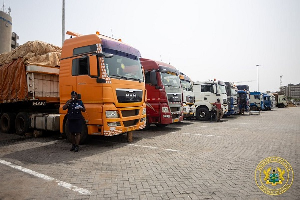The Electoral Commission (EC) on Thursday said it was ready to start the nationwide biometric voter registration exercise from Saturday, March 24 to Saturday, May 5 to capture the data of approximately 12 million potential electorate.
The EC said the exercise would begin from 0700 hours to 1800 hours daily including Saturdays and Sundays for all eligible voters across the country.
It said about 42,000 temporal personnel had been trained to operate the 7,000 digital registration kits for the exercise with the capacity to register between 100 and 150 persons per day.
Dr Kwadwo Afari-Gyan, EC Chairman told the Ghana News Agency in an interview that for operational purposes, the nationwide exercise would be carried out in four phases with each phase lasting for a maximum of 10 days with weekends inclusive.
The EC Chairman said phase one of the registration exercise would start on March 24-April 2; the second phase continuing almost immediately from April 4-13; third phase from April 15-24 and the final phase running from April 26-May 5.
He said four polling stations would be combined to form a cluster of registration points and advised all Ghanaians of 18 years and above with sound mind to take advantage of the opportunity to register.
The EC Chairman said registration would be done at registration centres, which would serve as polling stations during elections; in line with the basic principle of where you register is where you vote.
Dr Afari-Gyan assured people with disability that the Commission had readied itself to register persons with disability to enable them to exercise their franchise in the 2012 Presidential and Parliamentary Elections.
"If you are disabled, the machine will register you. If you have [only] six fingers, the computer will register you, but if you have none, we will make special provision for you," he said.
"Registration will be done at registration centres, which will serve as polling stations during elections; in line with the basic principle of where you register is where you vote. Obviously, 7,000 kits are not enough for registration to be done in each of the country's 23,000 polling stations at the same time," he said.
In the circumstances, the polling stations in each district of the country have been grouped into clusters. Each cluster consists of four polling stations. A team of six persons will be responsible for the registration of voters in each cluster.
As part of the registration process, prospective voters will be required to provide their exact date of birth, their current residential address as well as their hometown address.
Applicants will also be required to show evidence of eligibility to register by providing either a birth certificate, valid passport, baptismal card, a valid driver’s licence or a national health insurance card, the national I.D card or the existing voter ID card.
The prints from all 10 fingers of applicants as well as their images will be captured digitally as part of the registration exercise.
In the event of an applicant having lost some fingers, the fingerprints of the available fingers will be captured. Special arrangements will also be made for the registration of persons without fingers.
After the registration formalities, applicants will receive a new voter’s ID card which contains their photograph and a bar code containing their unique ID card number.**
Politics of Thursday, 22 March 2012
Source: GNA












